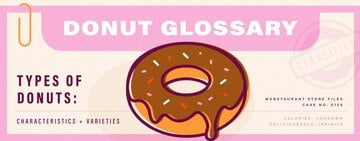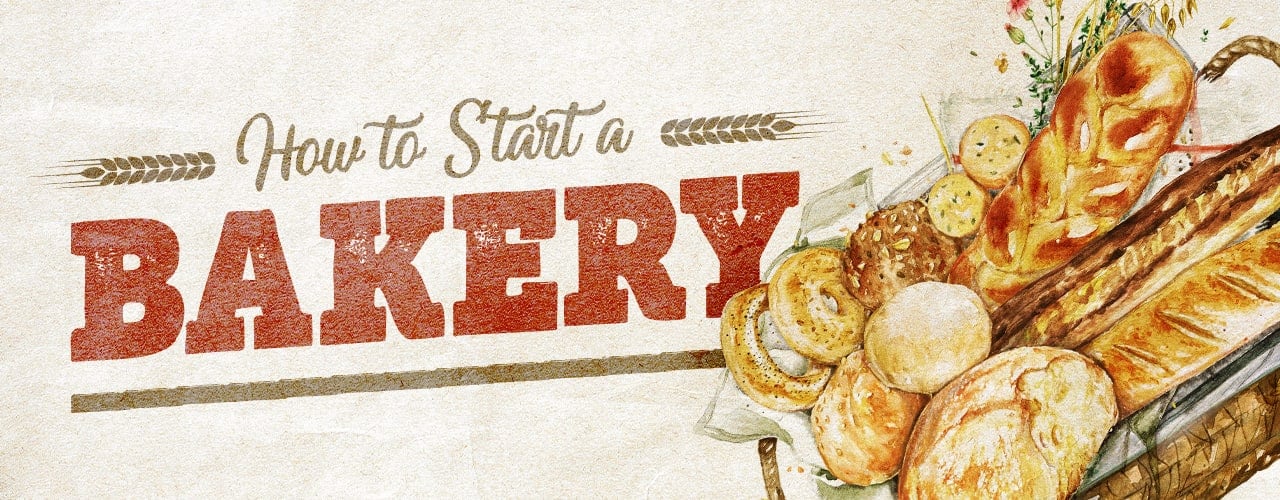
Whether you dream of opening a donut shop or a boulangerie, starting a bakery allows you to serve niche markets and express culinary creativity without taking on the financial burden of opening a restaurant. You can even start your bakery business from home before investing in a commercial space. While bakeries are comparatively accessible foodservice businesses, they present unique challenges. From writing a bakery business plan to getting funding and filing for permits, we walk you through each step of opening a bakery.
Shop All Bakery SuppliesHow to Start a Baking Business
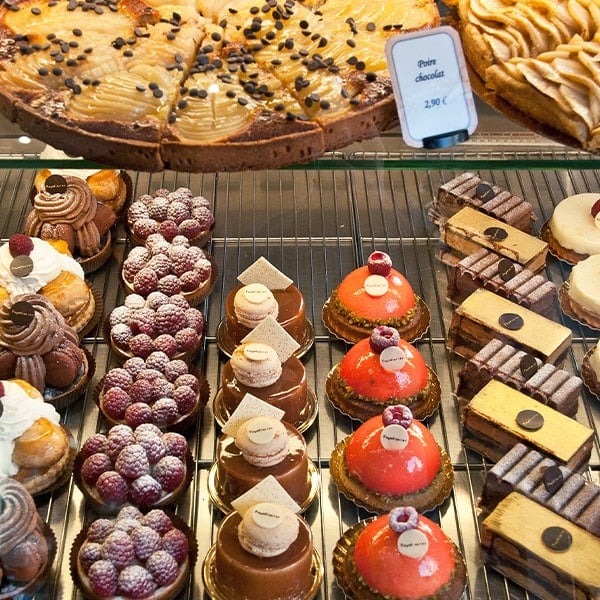
Whether you're passionate about creating decoratively frosted cakes or artisan sourdough loaves, you must create an action plan for turning your passion for baking into a business. Discover the steps of opening a bakery below.
1. Choose a Bakery Style
While there are many bakery business models, they all fall under one of two umbrella categories: retail and wholesale. Retail and wholesale bakeries make similar products, but they have different needs and customer bases.
Opening and Operating a Retail Bakery
Retail bakeries are the most common type of bakery; they sell baked goods and loaves of bread directly to customers. Retail bakeries come in many different forms, and they often specialize in a particular type of baked good. They require both front- and back-of-house space.
Types of Retail Bakeries
Discover the most popular retail bakery business models below:
- Bakery Cafe - This type of bakery is a combination of a bakery and cafe, and they typically sell baked goods like bread, pastries, and cookies. They also pair their baked goods with coffee and tea. Bakery cafes typically have a dining space where customers can sit and eat.
- Counter Service - While counter service bakeries have a front-of-house, most do not have a dining space. Instead, they have a counter where guests can order freshly baked goods to take home.
- Bakery Food Trucks - Rather than using a brick-and-mortar store, food truck bakeries sell their products from a mobile truck. Due to the small space, many bakery food trucks do not bake in their truck, instead opting to bake their products ahead of time in a commissary kitchen or home bakery.
- Specialty Bakeries - A specialty bakery typically focuses on one type of baked good, such as wedding cakes, cupcakes, or gluten-free baked goods. This type of bakery can excel because they offer niche products that customers either cannot find elsewhere or that are better than the products offered at less-specialized bakeries.
- Home Bakeries - This type of bakery is becoming more common, especially because you don't need a lot of startup capital or culinary experience to open a home bakery. Home bakeries typically market their products online and then ship them to customers. Many home bakeries are also very niche or offer twists on classic baked goods.
Opening and Operating a Wholesale Bakery
The other main type of bakery is a wholesale bakery. Rather than selling their products directly to customers, wholesale bakeries market their baked goods to businesses like grocery stores, restaurants, delis, and cafes.
Because wholesale bakeries have to meet the demands of commercial customers, they are typically larger than retail bakeries. Wholesale bakeries don't need to have a front-of-house or a desirable, high-traffic location. However, wholesale bakeries must produce high volumes of baked goods. This requires a large space and lots of baking equipment, resulting in higher startup costs.
Back to Top2. Write a Bakery Business Plan
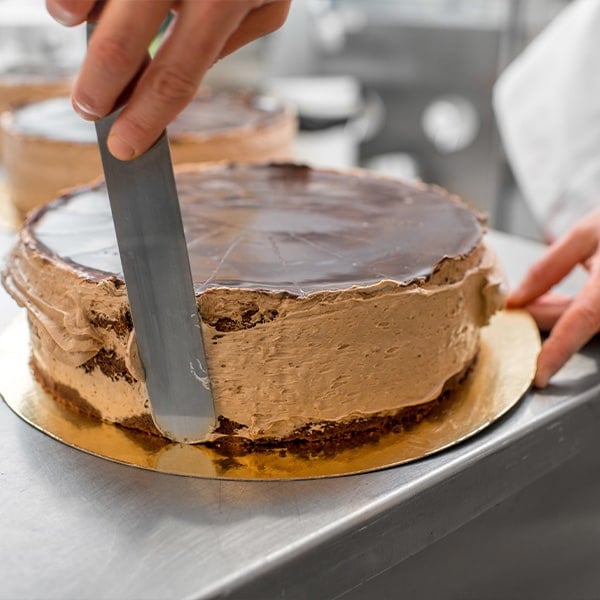
The first step in opening your new establishment should be to write a bakery business plan. The business plan is an integral part of starting a bakery business because it lays out what type of bakery you want to open, how it's going to be structured, what sort of products you're going to sell, marketing strategies, and financial projections. There are seven main sections to a bakery business plan:
- Executive Summary
- Company Overview and Description
- Market Analysis
- Business Offerings
- Management Plan and Ownership Structure
- Marketing and Advertising Strategy
- Financial Projections
Your business plan serves as the foundation for your business, and a strong plan can help you get funding and make the process of opening a new bakery easy.
Back to Top3. Obtain Loans and Startup Capital
When starting a bakery, there are many costs that you'll need to consider, such as leasing a commercial space, getting insurance, outfitting your space with equipment, hiring and training staff, stocking your kitchen, and paying for utilities. As a result, you'll need to have a significant amount of money available to cover these costs. Additionally, it may take a few months after opening for your bakery to become profitable, so you'll need cash on hand to cover costs for several months after opening.
If you’re wondering how to open a bakery with no money, you'll need to take out loans. There are three common ways business owners get funding: commercial loans, business lines of credit, and small business loans.
- Traditional Commercial Loan - You can apply for a traditional commercial loan at any major or local bank. This type of loan has lower interest rates and provides access to large amounts of capital. However, it requires you to have a high credit score. You may have to wait for months to access the money.
- Business Line of Credit - A line of credit is similar to a credit card. You get approved to use up to a certain amount, but you're only charged for the amount you use. Additionally, as you pay off the balance, you can access more credit. But, a line of credit doesn't allow you to access as much money as other loan types and requires a higher lending standard.
- Small Business Loan - Created by the Small Business Association, a small business loan is a type of loan that aims to protect small businesses and provide them with startup capital. Small business loans typically have lower interest rates and are available to people with borderline credit. They require collateral and may take longer to be approved than other loan types.
Cost to Open a Bakery
Bakery startup costs range between $10,000 and $50,000. The vast startup cost price range reflects the diverse array of bakeries. How much money you need to start a bakery depends on its location, equipment, staffing requirements, and menu items.
Back to Top4. Lease a Commercial Bakery Space
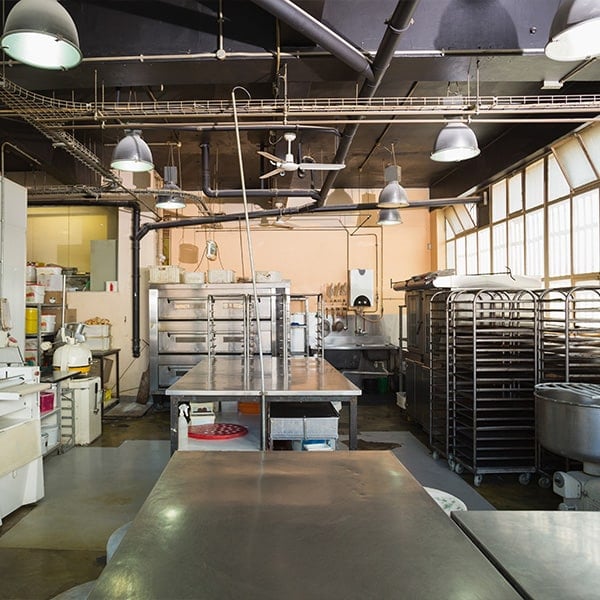
Once you've secured funding, you can start looking for a commercial space for your bakery. The type of commercial space you need depends on the type of bakery you're opening. For example, if you're opening a food truck bakery, you'll need to purchase the truck and you may want to look into renting space in a commissary kitchen.
Retail bakeries will want to look for a space in a central location close to their target demographic that also has a front-of-house area. Because wholesale bakeries sell their products to businesses rather than customers, they can be located farther from the city center or populated areas.
Best Place to Open a Bakery
The best place to open a bakery is at an accessible location near your suppliers and your target demographic. Regardless of the type of bakery you're opening, there are universal considerations for where you start your bakery business. Consider the following in your bakery location analysis:
- Demographics
- Accessibility
- Proximity to Suppliers
- Competition
- Size and Space Requirements
- Health Regulations and Zoning
- Safety and Crime Rates
Once you've found a suitable location for your business, you can hire a lawyer to draw up and negotiate a lease with the landlord. To protect yourself from any potential issues when negotiating a lease, be sure to specify the length of the lease, any raises in rent that might be included, who will pay for potential renovations, and any utilities that are covered.
Back to Top5. Obtain Bakery Licenses and Permits
The foodservice industry is heavily regulated on a federal, state, and local level, and there are some bakery licenses and permits you need to start your baking business. The types of permits you'll need will vary depending on your location, so be sure to check your local laws and regulations to see if there are any specific laws that apply to your new business.
Back to Top6. Order Bakery Equipment
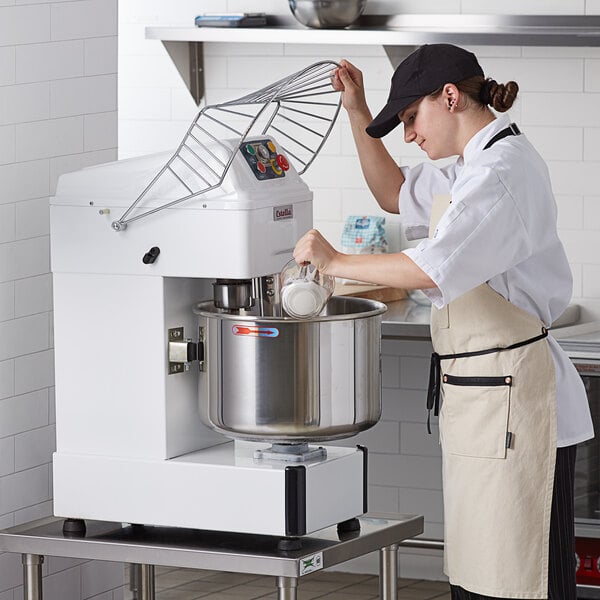
The equipment that your bakery will need depends on what type of baked goods you will be preparing. For example, you may need specific pastry supplies to create French pastries. While the specific equipment may change depending on the size and type of your bakery, there are several purposes you need to fill:
- Dough Preparation - Bread making supplies include equipment like commercial mixers, work tables for kneading, dough dividers, dough sheeters, and dough scales. You may also need holding cabinets, proofing cabinets, retarder/proofer combos, and refrigerators to prepare your dough.
- Storage - Storage is important for keeping your kitchen organized. Your bakery will require shelving and storage racks. If you're working with bulky bags of flour and sugar, you should invest in trucks, dollies, and carts to move large bags around your kitchen.
- Baking Equipment - Convection ovens are a great all-purpose piece of bakery equipment because they provide dry heat and bake evenly. If you're preparing a lot of artisan bread, you may want to choose a deck oven to give your products a crispy base. Wholesale bakeries may be looking for high-output ovens, such as roll-in rack ovens or revolving ovens.
- Display and Sales Equipment - Choosing the right display cases for your baked goods can help boost your sales. You can choose self-service or full-service cases, and there are refrigerated and unrefrigerated options, depending on your needs. In addition to your display cases, be sure to also choose stylish boxes and packaging for your baked goods.
- Cleaning and Warewashing Supplies - A 3-compartment sink is the centerpiece of any cleaning station. You must also order hand washing stations for your employees, disposable gloves, cleaning chemicals, sponges, scrubbers, and other essential cleaning items.
Bakery Smallwares
In addition to your large equipment, you must stock your bakery with smallwares, such as mixing bowls, storage boxes, whisks, bread knives, and aprons. We compiled a list of essential bakery equipment to ensure you don't forget anything.
You can download the opening a bakery checklist PDF below:
Download Baker Smallwares Checklist PDFBack to Top
7. Layout Your Bakery
After securing a location and deciding what equipment is needed to start your new bakery, you can plan your bakery kitchen organization. If your bakery has a front-of-house area, you will need to design a floor plan. Learn how to lay out your bakery kitchen and storefront below.
Commercial Bakery Kitchen Layout
Every bakery kitchen requires four sections: cleaning, storage, food preparation, and meal cooking. Bakery cafes and bakeries with a front-of-house area will also have a service station, where they deliver food to customers. The ideal bakery kitchen layout is determined by the space and the placement of water and gas lines. Organize your bakery kitchen so the four sections flow together and measure your space to make sure you have enough room for your bakery equipment before finalizing your kitchen plan.
You will want to lay out your kitchen based on the logical flow of food through the baking process. This starts with the storage area and then goes to the food preparation and meal cooking sections. Once you’ve prepared your baked goods, you can serve them to your customers, package them for display, or ship them to online customers. Finally, your dirty dishes, pots, and pans will end up at the cleaning station.
Commercial Bakery Storefront Layout
Some bakeries will have a front-of-house area where customers can browse their selection of baked goods. Optimizing your bakery floor plan for ideal product placement and customer comfort prompts purchases.
Bakery Layout
There are four main bakery layouts, each with its own unique benefits.
- Straight Bakery Floor Plan - Your bakery display cases are organized in straight lines to make it easy for customers to browse.
- Angular Bakery Floor Plan - This floor plan uses curved displays to create an upscale presentation.
- Diagonal Bakery Floor Plan - A diagonal floor plan allows customers to flow through your bakery.
- Mixed Bakery Floor Plan - Maximize your space by using a combination of all the bakery floor plans.
8. Hire and Train Bakery Staff
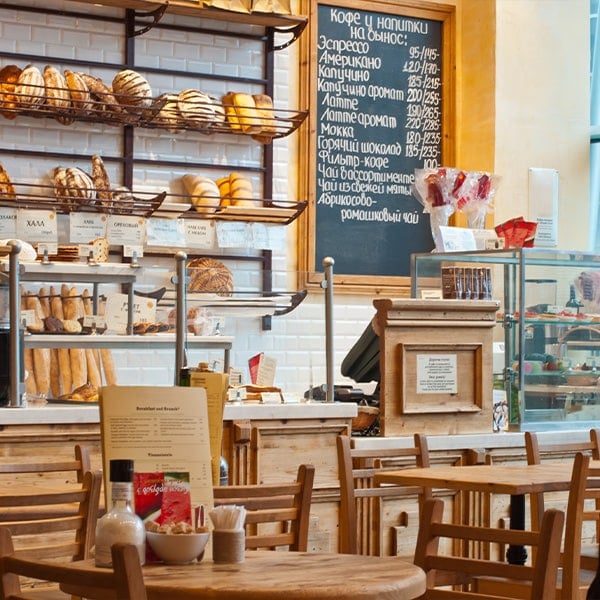
The size of your staff will depend on the scale and style of your bakery. A locally owned and operated bakery with just one location is likely to have a short chain of command. Retail bakeries must hire and train front-of-house staff to take orders and work the cash register. However, most of your bakery staff will work in the back-of-house, preparing your baked goods.
Your bakery should have at least one or two employees that have formal training or bakery experience to oversee the actual baking process. You may also want to hire unskilled workers for washing dishes, mixing ingredients, packaging products, and doing other tasks that don't require previous experience or expertise.
Some bakeries will also need professional pastry chefs and personnel to complete delicate and specialized tasks. For example, bakeries that bake wedding cakes should look for experienced cake decorators. Bakeries that offer artisan breads should consider hiring someone who specializes in bread baking.
Back to Top9. Market and Advertise Your Bakery
Before you open your bakery to the public, you must conduct some marketing and advertising campaigns to get the word out and create buzz. You can break your bakery marketing strategy into five general steps:
- Conduct market research. The first step in a marketing campaign is to conduct market research and determine your target market. This includes information like the demographics around your bakery, any competitors, and niche markets you can fill. Once you have an idea about who your target market is, you can develop strategies for attracting them.
- Write a market analysis. Your market analysis is a summary of your market research, and it should go in your bakery's business plan. It should include information such as the average income level in your area, discretionary spending among your target market, and your competitor's prices.
- Set goals for your marketing campaign. Create realistic goals for your bakery and its marketing and advertising campaign. For example, set goals for how many followers you want to gain on your social media accounts and how many sales you want to get in a month.
- Determine how you want to advertise your business. There are many ways you can advertise your bakery and each has its benefits. If you're in an urban area, using signs is a great and affordable option. Consider traditional advertising tactics, such as newspaper advertisements and flyers.
- Create a social media presence. Social media marketing is a great way to interact with your customers, create buzz, and advertise your grand opening and other events. Additionally, many people will look for your bakery's website and social media accounts before deciding if they want to visit, so make sure that you have an active online presence.
Many of these tactics apply to retail bakeries, but marketing tactics differ for wholesale bakeries. Wholesale bakeries should focus on competitor analysis and research where local restaurants and grocery stores source their baked goods. Then, they can reach out and try to make a deal.
Back to Top10. Host a Grand Opening
The final step in opening a bakery is to host your grand opening and welcome customers to your business. A successful grand opening can get your new bakery off to a good start and help generate loyal customers. You should advertise your grand opening to create interest and alert your target audience that your bakery is open for business.
One great way to get customers in your bakery for your grand opening is to offer discounts and specials. For example, you can offer discounts for the first 100 people to visit. Another option is to give customers who order a dozen cupcakes one cupcake for free. You can also offer free samples to encourage customers to make purchases and expose them to more of your products.
Back to TopDo You Need a Culinary Degree to Open a Bakery?
You don’t have to have a culinary degree or a bachelor’s degree in business to own a bakery. However, having hands-on experience or academic knowledge of both the baking and business management aspects of owning a bakery will help you succeed. Having a formal education may help you attract investors and banks to garner the startup capital you need to open your bakery. Consider getting a certification from the Retail Bakers of America (RBA). The RBA certification verifies your knowledge, skills, and abilities without the hefty time and financial commitment of culinary school.
Starting a bakery presents unique opportunities and challenges from starting a traditional restaurant. Creating a detailed business plan, following it precisely, and keeping your documents organized will help get your business off to a good start. Reference back to our guide to ensure your bakery launch goes smoothly and brush up on popular baking terms to communicate clearly with staff and customers.




